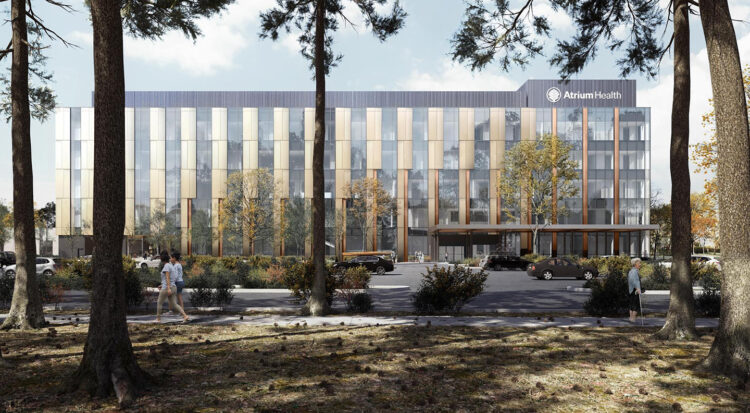
Updated rendering of the new Atrium hospital
July 24. By Dave Yochum. The Charlotte-Mecklenburg Hospital Authority (CMHA) is filing a Certificate of Need application to relocate 23 licensed acute care beds from Carolinas Medical Center (CMC) to Atrium Health Lake Norman, the new acute care hospital under construction on the old Augustalee property in Cornelius.
The new hospital, originally approved for 30 beds, is expected to be up and running next year.
If the new Certificate of Need (CON) application is approved, Atrium Health Lake Norman would have 53 licensed acute care beds.
Mayor Woody Washam said he is pleased that Atrium is filing a CON to expand their initial application.

Mayor Washam
“This significant percentage increase in beds demonstrates the need and their commitment to provide quality medical services to our community,” Washam said.
The new hospital is expected to open with approximately 280 new jobs based on 30 beds. A fifth floor was added to the original four-floor plan.
More growth
In a press release issued on the day of groundbreaking May 31, 2023, Atrium said there is a need for emergency, primary and specialty care due to the “tremendous population growth” here.
In a recent email, Atrium said “as a result of this growth, our community needs additional healthcare resources like acute care beds.”
The proposal for 23 more beds “will ensure that the facility has the resources necessary to care for the growing population in the Lake Norman area, allowing patients who live in the area to receive care closer to home.”
Exit 27
Traffic congestion is a concern.
The Town of Cornelius continues to lobby the NC Dept of Transportation for a new I-77 interchange at Mile Marker 27, adjacent to the hospital property. The astounding cost of the interchange—somewhere between $50 million and $75 million is the problem.
Town Board member Micheal Osborne is asking residents to voice support for a new interchange by emailing the Charlotte Regional Transportation Planning Organization, the regional transportation authority.
Background
Bromont, a Scottsdale, Ariz., developer, set Cornelius on its collective ear when it paid $34 million for roughly 100 acres along Hwy. 21 opposite Bailey Road. It was actively farmed by members of the Cook family until about 2006.
Plans back in 2006-2007 called for a 1.4 million-square-foot mixed-use project dubbed The Village at Lake Norman in Cornelius. It would have competed with Birkdale and LangTree in Mooresville, which had equally ambitious plans before the real estate market fell apart.
The Village morphed into Augustalee, and the project became the talk of the economic development world. Walt Rector, a noted equestrian, had plans for a $40 million exit off Interstate 77. Dubbed Exit 27 back then, it would have relied on government grants generated by the increased tax revenue the project could generate.
The Augustalee plan, with coveted exposure on I-77 between Exit 25 and Exit 28, is long gone, but one or two ownership changes later, Atrium has placed the new $255 million hospital on about 30 acres of the Augustalee property.

Bill Leonard, the facility executive for Atrium Health University City | Photo by Jason Benavides
Speaking at a Newsmakers Breakfast in March, Bill Leonard, the facility executive for Atrium Health University City, would not disclose plans for the remaining 70 acres.
He could not be reached for comment this morning.
Insiders say Atrium has plans for a much larger regional medical center with the number of beds well into the hundreds at some point.
“I hope this expansion will continue in the months and years ahead to enhance many additional medical services for our citizens.
It is significant to welcome such a great corporate citizen to our town,” Washam said.
What does a Certificate of Need do?
The North Carolina Certificate of Need law prohibits health care providers from acquiring, replacing, or adding to their facilities and equipment, except in specified circumstances, without the prior approval of the Department of Health and Human Services. Prior approval is also required for the initiation of certain medical services. The law restricts unnecessary increases in health care costs and limits unnecessary health services and facilities based on geographic, demographic and economic considerations.




